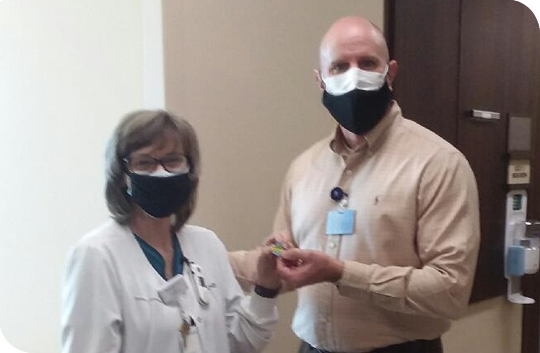Phoebe issued the following announcement on Nov. 9.
Organ donation is a complex undertaking and a delicate topic that hospitals must handle with compassion and understanding as they work with families who are considering donating a loved one’s organs. It can be especially challenging for smaller hospitals that do not often have organ donation opportunities.
Phoebe Sumter is better prepared to facilitate organ donation following one nurse’s completion of a training program. “I believe it will improve the process and help us get more organ donors through the process,” said Tammi Johnston, MSN.
Johnston has spent her entire 33-year nursing career at the hospital in Americus and is currently a nurse supervisor and clinical nurse educator. Recently, she completed a virtual Donor Resource Training Program hosted by LifeLink of Georgia, the state’s organ recovery organization. Two personal experiences led Johnston to take advantage of the training. “I had a good friend who passed away about a year and a half ago, and she was an organ donor,” Johnston said. “I saw that it can be a long process for families and a lot for them to deal with.”
Johnston was also recently involved with a potential organ donation at Phoebe Sumter that was not able to be completed. “I just wanted to broaden my knowledge to help our team and support families even better,” she said.
LifeLink Donor Resource Programs are a departure from the traditional collaborative conferences with hundreds of attendees and broad topics about donation. The Donor Resource Programs are limited to a small number of nurses, selected by LifeLink staff, hospital directors and hospital management teams. They are intentionally kept small to allow for more informal and in-depth discussions. Hospital attendees are trained in the donation process, allowing them to be additional resources at their respective hospitals with referrals, donor management of cases and family care.
Following Johnston’s training, Phoebe Sumter updated its policies and procedures regarding organ donation. “There was a lot of learning I felt I needed to best help our staff,” she said. “The course helped make it clear what the expectations are for everyone involved, and the OR team is really excited about the opportunities we may have in the future.”
The Donor Resource Role allows the hospital clinical staff to represent an in-depth knowledge base for nurse colleagues, ensure referral protocols are consistent with state and federal regulatory standards, identify and initiate timely referrals, assist with measures to address missed or late referrals, facilitate communication and supportive huddles during donor cases, implement the use of process improvement tools and understand the hospital's compliance performance through data.
LifeLink officials say they are proud of each new Donor Resource Training Program graduate and thank them for their continued support of organ and tissue donation.
Original source can be found here.
 Source: Phoebe
Source: Phoebe

 Alerts Sign-up
Alerts Sign-up